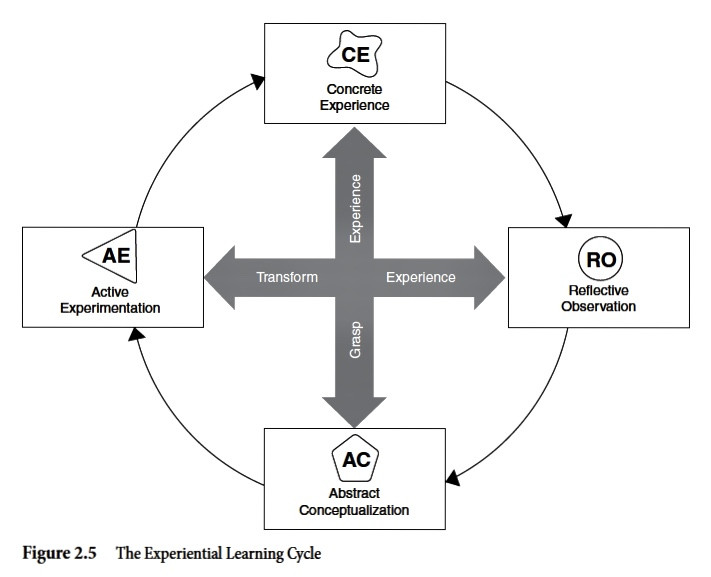What is Experiential Learning?
Learning Through Experience
Experiential learning theory is a holistic theory, which emphasizes how experiences, including cognitive and environmental factors, as well as emotions, influence the learning process. Simply put, experiential learning is the process of learning through experience, and is more specifically defined as "learning through reflection on doing.” 1 These emphases distinguish experiential learning theory (ELT) from other learning theories. The term “experiential” is used therefore to differentiate ELT both from cognitive learning theories, which tend to emphasize cognition over affect, and behavioral learning theories that deny any role for subjective experience in the learning process.2
Another reason the theory is called “experiential” is its intellectual origins in the experiential works of Dewey, Lewin, and Piaget. Gleaning from Dewey’s philosophical pragmatism, Lewin’s social psychology, and Piaget’s cognitive- developmental genetic epistemology form, David Kolb developed a unique perspective on learning and development now popularly called Experiential Learning Theory. 3
According to Kolb, “learning involves the acquisition of abstract concepts that can be applied flexibly in a range of situations.”4 In Kolb’s theory, the impetus for the development of new concepts is provided by new experiences. Kolb described learning as being comprised of two dimensions: prehending (or, grasping) information, and transforming (or processing) that information. The prehending dimension ranges from concrete experience to abstract conceptualization. The transforming dimension ranges from reflective observation to active experimentation.5 Kolb suggested that learning occurs as the learner progresses through each of the four stages of the learning cycle, namely: concrete learning, reflective observation, abstract conceptualization and active experimentation.
The diagram below best illustrates Kolb’s experiential learning cycle.6

The following would be an example of experiential learning: Someone goes on a missions trip to learn about a tribe through observation and interaction with members of that tribe, as opposed to reading about that particular tribe from a book. Through first hand experience and reflection on that same experience, a learner makes discoveries and experiments with knowledge gained firsthand.
Benefits of Experiential Learning
The benefits of experiential learning are manifold. First, it allows students to gain an overall understanding of the real-world environment. For example, students who major in Chemistry may have chances to interact with the chemical environment. Learners who have a desire to become business people will have the opportunity to experience management in a business setting. Second, it provides opportunities for creativity. As students are exposed to real-world situations, they are presented with the opportunity to formulate possible solutions to an observed problem. Third, it facilitates ease in retaining knowledge. As students interact with real-life experiences, they will have a better chance to retain that information. As Aristotle pointed out, “the things we have to learn before we can do them, we learn by doing them.”7 Fourth, since experiential learning focuses on the learning process for the individual, it effectively shifts the focus to the student as the responsible active and involved learner.
Finally, experiential learning benefits the student in almost every aspect of everyday life in general. Indeed, experiential learning is a process that develops an individual’s analytical, decision-making and problem-solving skills, all of which are necessary for leading productive and successful lives.
Experiential Learning Vital to Service in the Mission of God
Experiential learning teachers function as facilitators of learning. They encourage students to experiment, think independently and discover insights on their own. Their responsibility is to create opportunities for reflection on learning experiences to apply them to future learning.
An experiential learning component is vital in the preparation for the service in the mission of God. Its importance is manifold. First, EL makes learning relatable to students. Learning begins with the experience of the learner.8 Students build on what they already know and are provided with opportunities to make connections between new concepts and existing ones. Second, EL increases the effectiveness of learning because it involves the whole person. As students engage in critical thinking, reflect on their experiences, participate in learning communities, work with groups to resolve real problems, and make decisions they acquire necessary skills they learn to be successful agents of change in their chosen fields. Third, EL makes it easy for students to link theory to practice. EL provides opportunities to test theories in real-world situations and practice what they have learned by using them as a framework to resolve real problems. Fourth, EL increases students’ level of engagement because it involves students acting on learned theories to resolve issues and make a difference in their chosen field. Fifth, EL facilitates retention of knowledge. Reflecting on a concept towards effective praxis to address a real-life situation increases the likelihood of students retaining knowledge and eventually becoming experts in their own field. Sixth, an importance of EL is that it leads to the development of skills for lifelong learning and for life itself, i.e., analytical and problem-solving skills. Finally, EL is important in the preparation for the service in the mission of God because it is compatible with the example left by the Master Teacher himself in training his disciples. As a teacher, Jesus utilized EL to prepare the disciples to continue his kingdom work. The disciples observed Jesus in everything he did. Jesus deployed the disciples by twos to facilitate their learning to minister by carrying out his instructions. When they came back, they excitedly reported to Jesus the many healings they had witnessed as they ministered. The disciples learned by doing and asking questions and reflecting on the questions/answers Jesus provided. The Apostle Paul told his spiritual sons and daughters to “follow me, as I follow Christ.” Implicit in this instruction is the necessity of observation, for how does one follow a leader or mentor without closely observing that person’s behavior and actions?
In sum, EL is a key component in training for the service in the mission of God because it is an approach that effectively maximizes learning; it equips the mind of the student towards impactful exercise of the call God has placed on his/her life. Through EL one gains wisdom, a quality for which human beings are exhorted to seek in the Scriptures.

Reference List
1. Felicia Patrick, Handbook of Research on Improving Learning and Motivation through Educational Games (Hershey, PA: IGI Global, 2011) 1003.
2. David A. Kolb, Richard E Boyatzis, and Charalampos Mainemelis, Experiential Learning Theory Previous Research ad New Directions (1999), accessed July 9, 2018, https://www.d.umn.edu/~kgilbert/educ5165-731/Readings/experiential-learning-theory.pdf
3. D.A. Kolb, Experiential learning: Experience as the source of learning and development, 38.
4. David A. Kolb, Richard E Boyatzis, and Charalampos Mainemelis, Experiential Learning Theory Previous Research ad New Directions (1999), accessed July 9, 2018, https://www.d.umn.edu/~kgilbert/educ5165-731/Readings/experiential-learning-theory.pdf
5. Patricia H. Murrell and Charles S. Claxton, Experiential Learning Theory as a Guide for Effective Teaching (1987) in the Wiley Online Library, accessed July 9, 2018, https://onlinelibrary.wiley.com/doi/abs/10.1002/j.1556-6978.1987.tb00735.x
6. David A. Kolb, Experiential learning: Experience as the source of learning and development. 2nd ed. Upper Saddle River, NJ: Pearson Education, Inc., 2015), accessed June 13, 2018. https://www.pdfdeal.com/experiential-learning-experience-as-the-source-of-learning-and-development-2nd-pearson-pdf-ebook
7. Aristotle, Nicomachean Ethics, ed. Roger Crisp (2000), 23, in the Questia Digital Library, accessed July 11, 2018, http://www.questia.com/read/107180129/nicomachean-ethics.
8. Ronald E. Hansen, “The Role of Experience in Learning”, Journal of Technology Education 11, no. 2, (Spring 2000), accessed July 11, 2018, https://scholar.lib.vt.edu/ejournals/JTE/v11n2/pdf/hansen.pdf
